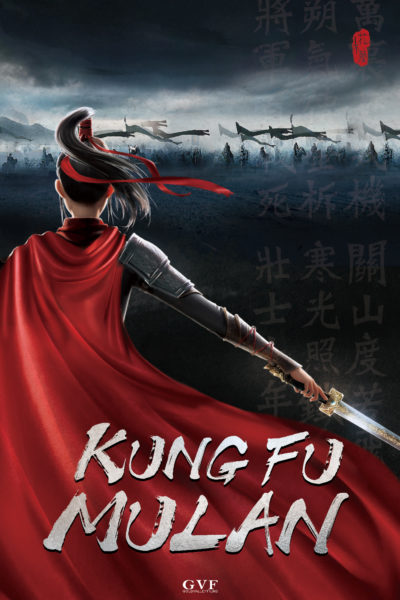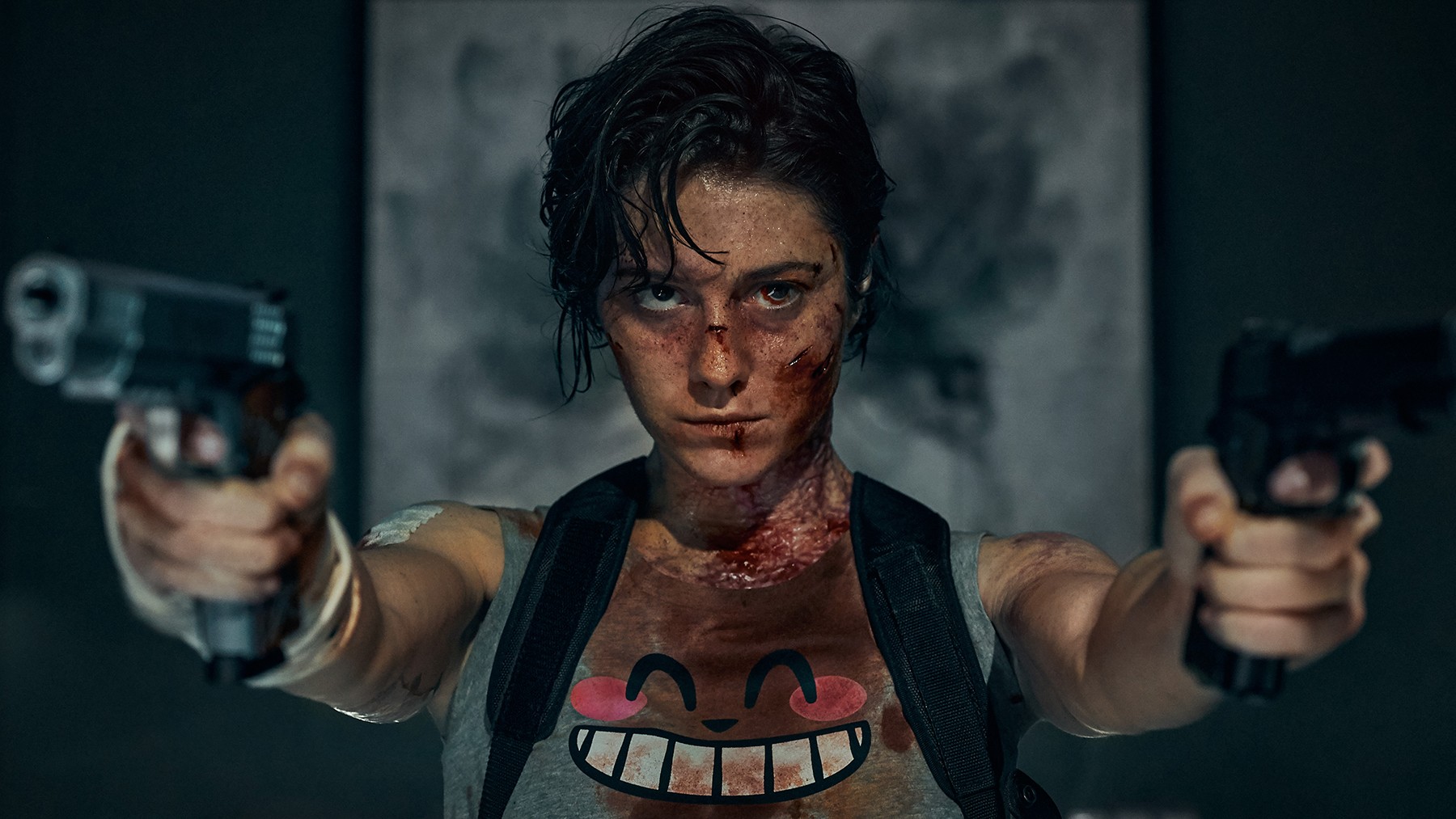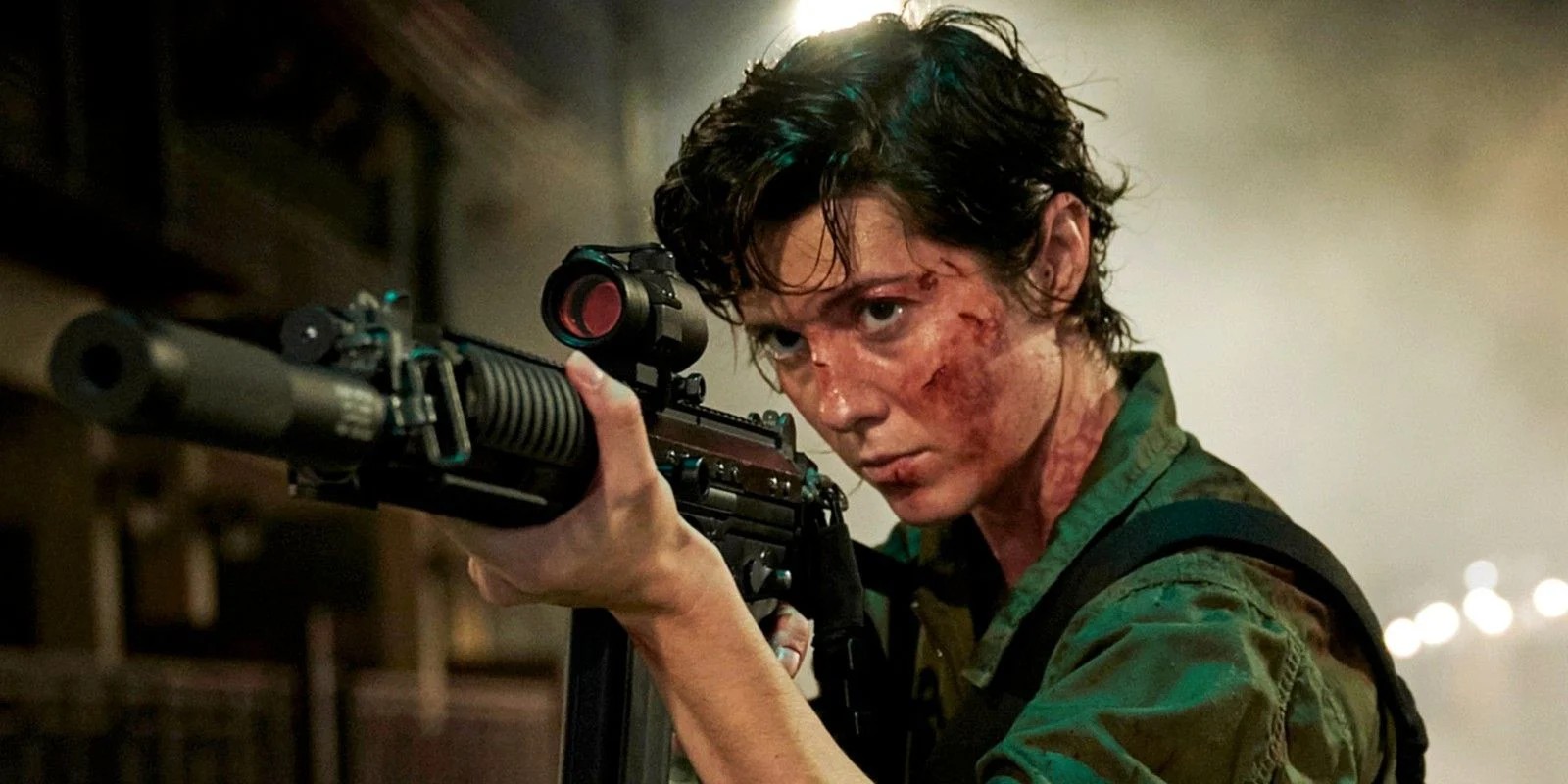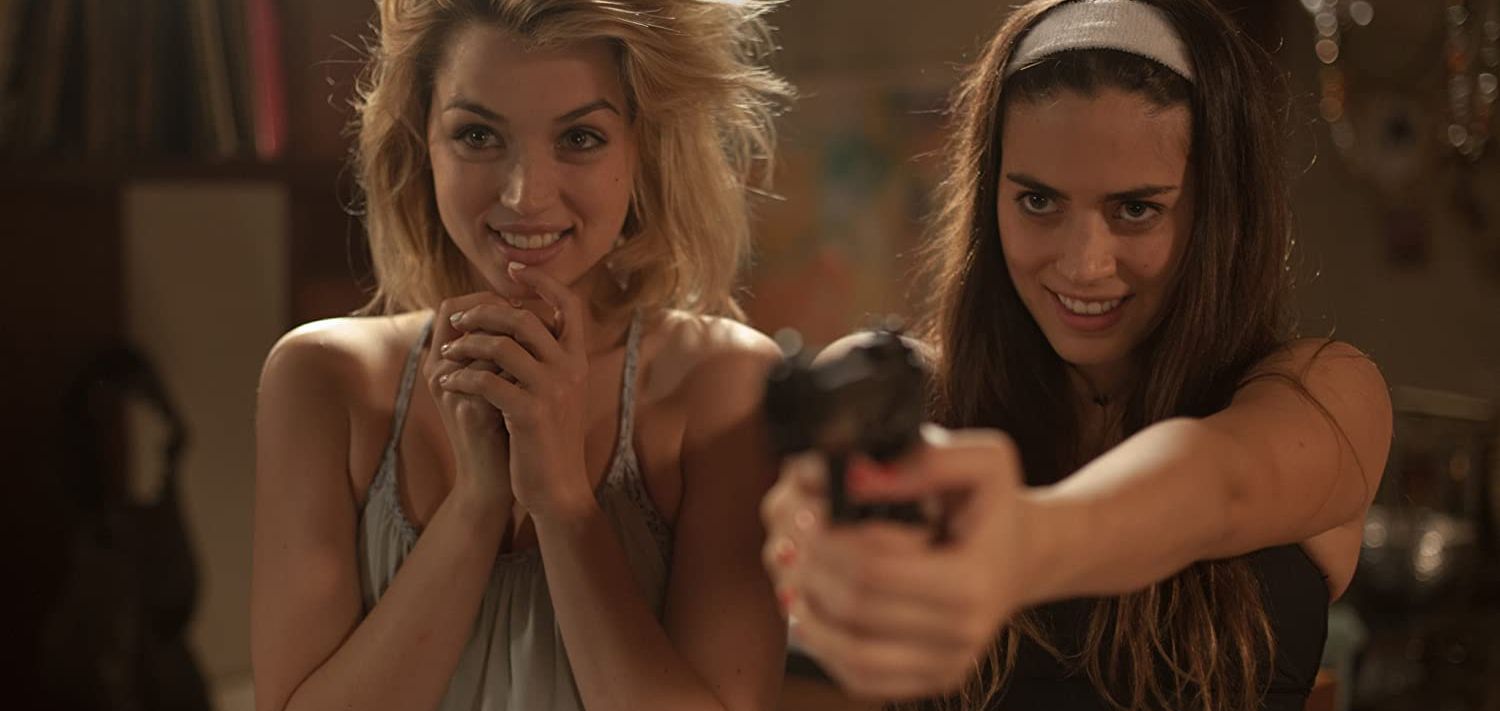★★½
“Do, a dear…”
 Firstly, I’m not quite sure whether this is a movie or not. The IMDb lists it with a running time of 98 minutes, but Tubi had it as 4 x 25-minute episodes. I’m guessing the former is just a compilation of the latter, it works about the same either way. The title translates as “The way of the empty hand”, and the emphasis here is very much on the first part: the journey. The heroine is Nicki Wright (G. Niebauer), who has barely got out of rehab for alcohol problems, when she gets involved in a brawl, after seeing a woman being assaulted by a man. Her mother had had enough of dealing with Nicki’s taciturn BS, and dumps her on her father, Cliff (D. Niebauer).
Firstly, I’m not quite sure whether this is a movie or not. The IMDb lists it with a running time of 98 minutes, but Tubi had it as 4 x 25-minute episodes. I’m guessing the former is just a compilation of the latter, it works about the same either way. The title translates as “The way of the empty hand”, and the emphasis here is very much on the first part: the journey. The heroine is Nicki Wright (G. Niebauer), who has barely got out of rehab for alcohol problems, when she gets involved in a brawl, after seeing a woman being assaulted by a man. Her mother had had enough of dealing with Nicki’s taciturn BS, and dumps her on her father, Cliff (D. Niebauer).
Turns out Cliff was a bit of a karate bad-ass, and agrees to teach his estranged daughter the martial art. However, while Nicki wants simply to learn how to beat people up, Cliff insists on the process, beginning with the simplest of forms, and teaching her as much about the philosophy of karate, as the physical movements. He also introduces her to other martial arts, such as kendo, and Nicki (inevitably) begins to realize there is considerably more to the field than pure aggression. Inspired by her father’s teachings, she seeks to pass it on to high-school girls, so they can defend themselves. Her plan does not meet with unbridled enthusiasm by the local principal, shall we say. Meanwhile, her father finds himself in desperate need of cash, after his stock investments tank.
If you’re a fan of training montages – especially with voice-overs – boy, is this the movie for you. Normally, that would be a severe problem, but as mentioned above, this is not a film about beating people up. It’s about the spiritual transition which can be obtained through rigourous physical training. As such, it’s likely among the most accurate martial-arts films I’ve ever seen, in the sense of being true to the central ethos and overall philosophy. There’s no rival school with which to duel. No climactic tournament. The biggest battle Nicki faces is with her inner demons, in the form of her alcoholism. You have to respect the film-makers’ adherence to their core beliefs.
That said… There’s a reason why most films introduce such artificial conflicts. Because, truth be told, “real” martial arts is pretty damn dull, as a viewing experience to the casual spectator. As depicted here, it has about the entertainment quotient of watching aerobics. Matters are not helped by the way this seemed to finish after four episodes without any of the threads being satisfactorily resolved. It feels like more were needed to address the story-lines, and the result was unsatisfactory. I did enjoy the familial feel here: I’m guessing Nicki and Cliff genuinely are father and daughter, or something similar, and their relationship is convincing. However, that is not enough to overcome an underwhelming lack of dramatic structure, and unless you’re a karate student yourself, I can’t honestly recommend this.
Dir: Jessie Topsi
Star: Gabrielle Niebauer, Dan Niebauer, Paris Moletti, Heather Alexander





 Josie (Scott) is a babysitter, though her real interest is her work as a leader in the Girl Guide-like “Mustard Seed” summer camp. In this she mentors young girls, and accumulates some nifty skills of her own. This is relevant, due to her current situation. She’s taking care of Sophie (Hazen), the youngest daughter of the Castillo family. The father is a rich music mogul, and they live in a remote mansion, deep in the Utah mountains. The family come back early, but before Josie can leave – she’s playing hide and seek with Sophie – there’s a home invasion by three people, under the leadership of The Woman (Yeaman). They’re no regular burglars, but members of a Satanic cult, intent on retrieving artifacts hidden in the house by its previous owners. These can then be used to sacrifice the inhabitants, and open a portal for… something not very nice to enter our world.
Josie (Scott) is a babysitter, though her real interest is her work as a leader in the Girl Guide-like “Mustard Seed” summer camp. In this she mentors young girls, and accumulates some nifty skills of her own. This is relevant, due to her current situation. She’s taking care of Sophie (Hazen), the youngest daughter of the Castillo family. The father is a rich music mogul, and they live in a remote mansion, deep in the Utah mountains. The family come back early, but before Josie can leave – she’s playing hide and seek with Sophie – there’s a home invasion by three people, under the leadership of The Woman (Yeaman). They’re no regular burglars, but members of a Satanic cult, intent on retrieving artifacts hidden in the house by its previous owners. These can then be used to sacrifice the inhabitants, and open a portal for… something not very nice to enter our world.  Going into this, I was expecting it to be really terrible. After all, this Chinese animated version seemed to be little more than a mockbuster, riding on the trails of Disney’s
Going into this, I was expecting it to be really terrible. After all, this Chinese animated version seemed to be little more than a mockbuster, riding on the trails of Disney’s  ★★★
★★★ There is also, quite often, some kind of emotional resonance, in the cases where the child is not biologically related [when that is the case, you don’t typically need or get any more explanation, blood being thicker than water]. Maybe the kid acts as a surrogate, a replacement for one previously lost (Alien), or the heroine could never have. Or if a girl, the protagonist can perhaps see a younger version of herself. The other common theme is the use of the child as a key, to unlock the adult. Often, the latter has lost her humanity, typically through harsh circumstances, becoming largely a lone figure, with her emotions suppressed. The “childlike innocence” of the young person, to use a cliché, can be used as a psychological crowbar, pricing open the hard shell of the grown-up, allowing them to reconnect with their humanity. The more emotionally-driven immaturity also stands in contrast to the adult’s stoicism, often to an extreme degree.
There is also, quite often, some kind of emotional resonance, in the cases where the child is not biologically related [when that is the case, you don’t typically need or get any more explanation, blood being thicker than water]. Maybe the kid acts as a surrogate, a replacement for one previously lost (Alien), or the heroine could never have. Or if a girl, the protagonist can perhaps see a younger version of herself. The other common theme is the use of the child as a key, to unlock the adult. Often, the latter has lost her humanity, typically through harsh circumstances, becoming largely a lone figure, with her emotions suppressed. The “childlike innocence” of the young person, to use a cliché, can be used as a psychological crowbar, pricing open the hard shell of the grown-up, allowing them to reconnect with their humanity. The more emotionally-driven immaturity also stands in contrast to the adult’s stoicism, often to an extreme degree. 
 This is the kind of film which makes for very uncomfortable date night viewing, simply because the situation presented is likely to lead to awkward conversations. Happily married architect Evan Webber (Reeves) has the house to himself for the weekend, his wife having gone with their two kids to the seaside, leaving him free to work on a project. A stormy night ensues, until a knock at the door, and he finds two lost young women, Genesis (Izzo) and Bel (de Armas), shivering on the doorstep. He can hardly make them stay there, so lets them in. Almost immediately, something is wrong, though initially this falls into the “Too good to be true” category. For they are nymphomaniac flight attendants, and inevitably – though after a credible struggle – Evan succumbs to their relentless charms.
This is the kind of film which makes for very uncomfortable date night viewing, simply because the situation presented is likely to lead to awkward conversations. Happily married architect Evan Webber (Reeves) has the house to himself for the weekend, his wife having gone with their two kids to the seaside, leaving him free to work on a project. A stormy night ensues, until a knock at the door, and he finds two lost young women, Genesis (Izzo) and Bel (de Armas), shivering on the doorstep. He can hardly make them stay there, so lets them in. Almost immediately, something is wrong, though initially this falls into the “Too good to be true” category. For they are nymphomaniac flight attendants, and inevitably – though after a credible struggle – Evan succumbs to their relentless charms. Firstly, I’m still trying to figure out the relevance of the cover (right). With a heroine named Kat, why is there a dog pictured? It’s not as if she even owns one at any point. The “size of the fight” line… well, tenuous at best. I should probably have listened to my instincts and skipped this frankly implausible tale, about a teenage girl who is smart, attractive and a black-belt martial artist with 34E breasts. Yet she ends up having to get work as a stripper, a job at which she is naturally brilliant (thanks to adopting a pseudo-Xena persona), in order to keep her alcoholic mother out of debt. She breaks the arm of a particularly unpleasant customer, Alex, an act which gets her the attention of Alex’s business partner. He runs McKenzie Personal Security, and offers Kat a job as a trainee bodyguard.
Firstly, I’m still trying to figure out the relevance of the cover (right). With a heroine named Kat, why is there a dog pictured? It’s not as if she even owns one at any point. The “size of the fight” line… well, tenuous at best. I should probably have listened to my instincts and skipped this frankly implausible tale, about a teenage girl who is smart, attractive and a black-belt martial artist with 34E breasts. Yet she ends up having to get work as a stripper, a job at which she is naturally brilliant (thanks to adopting a pseudo-Xena persona), in order to keep her alcoholic mother out of debt. She breaks the arm of a particularly unpleasant customer, Alex, an act which gets her the attention of Alex’s business partner. He runs McKenzie Personal Security, and offers Kat a job as a trainee bodyguard. I reviewed the
I reviewed the  I remember how the first series of Killing Eve blew my socks off, and was completely unlike anything else on television. The second series fell short, but that was unsurprising – how could it be otherwise? – and there was still the chance for it to mount a course correction and recover. This third installment, however, has if anything accelerated the downward trend. What was once must-see television has become something which sits on in the background, typically as I surf the Internet on my phone. I can’t think of another series which has collapsed in such a remarkably brief time-frame.
I remember how the first series of Killing Eve blew my socks off, and was completely unlike anything else on television. The second series fell short, but that was unsurprising – how could it be otherwise? – and there was still the chance for it to mount a course correction and recover. This third installment, however, has if anything accelerated the downward trend. What was once must-see television has become something which sits on in the background, typically as I surf the Internet on my phone. I can’t think of another series which has collapsed in such a remarkably brief time-frame. This rating is perhaps influenced by my seriously low expectations here. Having seen my share of generic “female ninja” films, all too often they tend to be thinly-disguised exercises in soft-porn. Any action elements are usually secondary, at best. That’s not the case here. Well, at least, not entirely. You’ll not mistake this for Crouching Tiger, yet there has been some thought put into the plot and characters, and this helps elevate proceedings to the level of satisfactorily watchable. Which is, as noted, considerably more than I was anticipating. It comes as a pleasant surprise, especiallyfor a film so obscurist, the IMDb doesn’t recognize it, director Noto’s sole credits being as an assistant in that role. The Amazon Prime synopsis is also from
This rating is perhaps influenced by my seriously low expectations here. Having seen my share of generic “female ninja” films, all too often they tend to be thinly-disguised exercises in soft-porn. Any action elements are usually secondary, at best. That’s not the case here. Well, at least, not entirely. You’ll not mistake this for Crouching Tiger, yet there has been some thought put into the plot and characters, and this helps elevate proceedings to the level of satisfactorily watchable. Which is, as noted, considerably more than I was anticipating. It comes as a pleasant surprise, especiallyfor a film so obscurist, the IMDb doesn’t recognize it, director Noto’s sole credits being as an assistant in that role. The Amazon Prime synopsis is also from  Regardless of its flaws, this does at least show that comic-book adaptations needn’t involve superheroes and Thanos snaps. This is instead a crime story, beginning towards the end of the seventies in Hell’s Kitchen, a working-class area of New York. Following a failed armed robbery, the husbands of Kathy (McCarthy), Ruby (Haddish) and Claire (Moss) are sent to jail, leaving the wives to fend for themselves. To make ends meet, the trio begin to move in on the territory of local boss Little Jackie, who has been taking money from local businesses, without delivering the promised protection. When Jackie goes after them, he is killed by the women’s ally, Gabriel (Gleeson), who begins a relationship with Claire. But the husbands’ return to Hell’s Kitchen looms on the horizon, as the women’s growing power also brings them unwelcome attention – both from the authorities and the Mafia who dominate the city.
Regardless of its flaws, this does at least show that comic-book adaptations needn’t involve superheroes and Thanos snaps. This is instead a crime story, beginning towards the end of the seventies in Hell’s Kitchen, a working-class area of New York. Following a failed armed robbery, the husbands of Kathy (McCarthy), Ruby (Haddish) and Claire (Moss) are sent to jail, leaving the wives to fend for themselves. To make ends meet, the trio begin to move in on the territory of local boss Little Jackie, who has been taking money from local businesses, without delivering the promised protection. When Jackie goes after them, he is killed by the women’s ally, Gabriel (Gleeson), who begins a relationship with Claire. But the husbands’ return to Hell’s Kitchen looms on the horizon, as the women’s growing power also brings them unwelcome attention – both from the authorities and the Mafia who dominate the city.